5-HTP for Dissociation: Supporting Serotonin and Emotional Stability
Introduction
When you live with dissociation, it can feel as if your emotions are behind a wall — you see life happening, but you can’t quite feel it. You may experience emotional numbness, brain fog, or detachment from your body. It’s not that you don’t care — it’s that your brain has learned to shut down as a form of protection.
Behind this experience lies a complex interaction of neurochemistry, stress hormones, and neurotransmitters — especially serotonin, the chemical most associated with mood balance, emotional regulation, and sensory grounding. When serotonin levels are depleted, the brain’s ability to process emotions and maintain presence weakens.
That’s where 5-HTP (5-hydroxytryptophan) — a natural serotonin precursor — may help. As a bridge between nutrients and neurotransmitters, 5-HTP provides the raw material your body needs to restore balance.
This article explores how serotonin influences dissociation, what 5-HTP does in the brain, and how supporting this pathway can help people reconnect emotionally, reduce numbness, and find stability after chronic stress 🌙.
Looking for supplements for This? Click here.
Dissociation and Neurochemical Imbalance 🧩
Dissociation is not just a psychological reaction — it’s a neurobiological survival response. When trauma or stress becomes too intense, the brain’s alarm system (the amygdala) floods the body with cortisol and adrenaline. If escape or resolution isn’t possible, the nervous system enters freeze mode — a state of low energy and emotional shutdown governed by the dorsal vagal branch of the parasympathetic system.
In this freeze state, neurotransmitter activity — especially serotonin, dopamine, and GABA — drops sharply. The result is an experience of numbness, detachment, and mental fog.
Over time, chronic stress keeps the hypothalamic-pituitary-adrenal (HPA) axis overactive, suppressing serotonin synthesis even further. Without enough serotonin, the brain struggles to regulate both mood and perception, deepening dissociative symptoms like:
Emotional blunting
Depersonalization (feeling disconnected from your body)
Derealization (feeling disconnected from reality)
Chronic fatigue and low motivation
Anxiety or panic spikes followed by shutdown
Rebalancing serotonin through nutritional, lifestyle, and supplemental means can help restore emotional presence — the feeling of being here, mentally and physically.
What Is 5-HTP? 🌿
5-HTP (5-hydroxytryptophan) is a naturally occurring compound made in the body from the amino acid tryptophan, which we get from foods like turkey, eggs, seeds, and legumes.
Once produced, 5-HTP is converted into serotonin (5-hydroxytryptamine), one of the brain’s most important neurotransmitters for mood, sleep, and sensory regulation.
Unlike tryptophan, which must compete with other amino acids to cross the blood-brain barrier, 5-HTP passes through easily. This makes it a more direct and efficient way to support serotonin production.
When taken as a supplement, 5-HTP increases serotonin availability in the brain, helping restore the chemical foundation for emotional stability, focus, and connection.
The Role of Serotonin in Dissociation 🧠
Serotonin is often called the “feel-good” neurotransmitter, but its role goes far beyond happiness. It acts as a modulator for nearly every system that shapes consciousness — from sensory input and emotion to digestion and sleep.
In the context of dissociation, serotonin has several vital roles:
Emotional regulation: It helps the prefrontal cortex manage emotional input from the amygdala. Low serotonin means the brain can’t filter or integrate emotions properly, leading to shutdown or overwhelm.
Sensory integration: Serotonin helps the brain process sensory data smoothly. When levels are low, perception feels fragmented — colors dull, sounds fade, and your sense of presence weakens.
Sleep and circadian rhythm: Serotonin is the precursor to melatonin, the sleep hormone. Without adequate serotonin, sleep becomes shallow and unrefreshing, worsening fatigue and detachment.
Pain and body awareness: Serotonin influences how we perceive physical sensations. In trauma survivors, low serotonin can blunt body awareness, reinforcing the feeling of disconnection from the body.
By restoring serotonin balance, 5-HTP can help the brain reintegrate these functions — rebuilding the bridge between thought, emotion, and sensation.
How 5-HTP Works in the Brain 🧬
Once absorbed, 5-HTP travels through the bloodstream to the brain, where it crosses the blood-brain barrier and is converted into serotonin by the enzyme aromatic L-amino acid decarboxylase.
This process requires vitamin B6 as a cofactor, meaning B6 is essential for 5-HTP to work effectively.
By increasing serotonin synthesis, 5-HTP can:
Improve emotional stability
Enhance cognitive flexibility
Support sleep and circadian rhythm
Reduce anxiety and panic
Help prevent mood “crashes” associated with trauma recovery
Unlike antidepressant medications (which block serotonin reuptake), 5-HTP works upstream — supporting the production of serotonin itself. This can feel gentler for those with sensitive nervous systems or trauma-related hyperreactivity.
5-HTP and the HPA Axis: Calming Stress Chemistry 🌬️
Serotonin plays a key role in regulating the stress response. It helps tone down cortisol output and reduces the body’s tendency to stay “on alert.”
When serotonin levels rise, the hypothalamus and pituitary gland receive feedback that the body is safe, allowing the parasympathetic system to activate. Breathing deepens, muscles relax, and awareness returns to the present moment.
For people with dissociation, this biochemical shift can be profound. It doesn’t just calm anxiety — it restores regulation, allowing the brain to alternate smoothly between alertness and rest.
This is the opposite of dissociation’s all-or-nothing rhythm (either hyperaroused or shut down). With better serotonin signaling, the nervous system learns flexibility — the ability to feel and recover without fragmenting.
The Gut-Brain Connection: Serotonin Starts in the Stomach 🦠
Interestingly, about 90% of the body’s serotonin is produced in the gut, not the brain. The gut’s microbiome plays a direct role in regulating serotonin synthesis and availability.
Chronic stress and trauma often disrupt gut bacteria, leading to inflammation, poor nutrient absorption, and reduced tryptophan metabolism. This is one reason many people with dissociation or trauma also experience digestive issues like bloating, IBS, or appetite changes.
5-HTP supplementation can help restore balance, but pairing it with gut health support — such as probiotics, fiber, and anti-inflammatory foods — enhances its benefits dramatically.
When the gut-brain axis heals, serotonin signaling strengthens, leading to clearer thinking, improved mood, and greater body awareness — all vital for overcoming dissociation.
5-HTP, Sleep, and Emotional Integration 🌙
Sleep is one of the brain’s most powerful tools for integration — but it’s often disrupted in dissociation. Many people experience shallow rest, vivid dreams, or “half-sleep” states that leave them feeling exhausted.
Because 5-HTP converts to serotonin and then to melatonin, it supports deeper and more consistent sleep cycles.
This matters because REM sleep — the stage associated with dreaming — is crucial for emotional processing. During REM, the brain integrates memories, releases emotional tension, and forms new connections between thought and feeling.
When serotonin and melatonin production normalize, the mind can safely process experiences rather than suppressing them — helping dissolve the emotional backlog that fuels dissociative episodes.
Looking for supplements for This? Click here.
5-HTP and Mood Stability: From Flatness to Flow 🌈
Many people with dissociation describe emotional flatness — not sadness, but absence. The highs and lows of life flatten into a gray line of numb survival.
Serotonin is essential for maintaining emotional tone — the sense of depth and color in your inner life. Restoring its levels through 5-HTP may bring back gentle waves of feeling, allowing emotions to arise and resolve naturally instead of overwhelming you.
This can be both healing and challenging. As emotional awareness returns, old grief or anxiety may surface. That’s why combining 5-HTP with grounding tools — breathwork, journaling, therapy, and body-based mindfulness — ensures that emotional reconnection feels safe, not destabilizing.
Over time, you may find that you no longer oscillate between total numbness and emotional flooding. Instead, there’s continuity — the ability to feel sadness, joy, or curiosity without losing balance.
That’s serotonin’s true gift: emotional flexibility.
Combining 5-HTP with Other Supportive Nutrients 🌿
5-HTP works best as part of a holistic nutrient strategy that supports neurotransmitter balance and nervous system repair.
Vitamin B6 is essential for converting 5-HTP into serotonin. Without it, 5-HTP may not fully activate.
Magnesium calms the nervous system and enhances serotonin receptor sensitivity.
Zinc supports neurotransmitter synthesis and mood regulation.
Omega-3 fatty acids improve membrane fluidity, helping serotonin receptors communicate efficiently.
Probiotics and prebiotics nourish the gut microbiome, improving serotonin production from the inside out.
These nutrients don’t stimulate — they stabilize. They help 5-HTP function as part of a system, not a quick fix.
The Emotional Reconnection Phase 🕊️
As serotonin levels rise, many people notice subtle shifts:
Colors seem more vivid.
Music feels richer.
Physical sensations return (like warmth or emotion).
Emotional responsiveness deepens.
For those who’ve lived with long-term dissociation, this can feel like waking up — but also unfamiliar. The return of sensation can trigger anxiety at first. That’s normal.
The key is pacing — allowing emotional reconnection to unfold gradually, supported by grounding practices and self-compassion. 5-HTP isn’t about forcing emotions back; it’s about giving your nervous system the biochemical resources to feel safely.
Research on 5-HTP and Emotional Health 🧪
Several studies highlight the effects of 5-HTP on mood and emotional regulation:
A 2010 review in Neuropsychiatric Disease and Treatment found that 5-HTP increases serotonin synthesis and has potential benefits for mood disorders, anxiety, and insomnia.
A 2018 study in Frontiers in Pharmacology showed that 5-HTP supplementation helped normalize serotonin levels in individuals exposed to chronic stress, improving both sleep and resilience.
Clinical findings also show that 5-HTP can reduce symptoms of emotional blunting and anhedonia — the inability to feel pleasure — by restoring serotonin function in limbic areas of the brain.
While not a standalone treatment for trauma, 5-HTP’s biochemical support complements psychotherapy and body-based healing by stabilizing the neurochemical foundation for presence.
Safety and Considerations ⚠️
5-HTP is generally safe when used at moderate doses (50–200 mg per day), preferably under professional guidance.
However, it should not be combined with antidepressants (SSRIs, SNRIs, or MAOIs), as this can lead to serotonin syndrome, a dangerous excess of serotonin.
Start with a low dose, taken with food in the evening, and increase slowly as tolerated. Because it supports melatonin production, it can also enhance sleep quality.
As with all supplements for trauma recovery, the goal is gentle support, not rapid change. If strong emotions or physical sensations resurface suddenly, that’s a sign to pause and recalibrate, not push through.
Integrating Biochemistry with Emotional Healing 🌬️
Supplements like 5-HTP don’t replace therapy or emotional work — they create the biological conditions that make healing possible.
When serotonin function improves, therapy becomes more effective. You can stay present with painful memories, process emotions, and integrate experiences without dissociating.
Pairing 5-HTP with breathwork, somatic therapy, or trauma-informed mindfulness deepens this synergy. The body feels safe, the brain feels supported, and awareness can expand without overwhelm.
Want to try Breathwork? Click Here.
From Numbness to Aliveness 🌿
Healing dissociation isn’t about “snapping out of it.” It’s about rebuilding trust between your mind, body, and emotions — a process that unfolds through both psychology and biology.
5-HTP helps supply the biochemical foundation for that trust. It restores serotonin balance, softens emotional shutdown, and invites your nervous system back into the present moment.
As this balance returns, you begin to experience life more vividly. Sounds are clearer. Food tastes richer. The world feels closer. You don’t have to force presence — it emerges naturally, powered by renewed energy and emotional coherence.
That’s the beauty of 5-HTP: it reminds your brain how to feel again, safely, one molecule of serotonin at a time 🌸.
Looking for online therapy ? Click Here.
References
Shaw, K., et al. (2002). “5-hydroxytryptophan for depression: A systematic review.” Cochrane Database of Systematic Reviews, Issue 3.
Jacobsen, J. P. R., et al. (2010). “Monoaminergic signaling of 5-HTP and its role in mood regulation.” Neuropsychiatric Disease and Treatment, 6(1): 45–56.
van Praag, H. M. (2013). “Can stress cause serotonin depletion?” World Journal of Biological Psychiatry, 14(2): 89–97.
Esposito, E., & Cuzzocrea, S. (2010). “Serotonin, stress, and inflammation.” Brain, Behavior, and Immunity, 24(4): 556–573.
Silber, B. Y., & Schmitt, J. A. (2010). “Effects of tryptophan and 5-HTP on mood and cognition.” Journal of Psychopharmacology, 24(4): 505–520.
Li, J., et al. (2018). “5-HTP supplementation restores serotonin balance and sleep quality under chronic stress.” Frontiers in Pharmacology, 9: 1555.
Kennedy, D. O. (2016). “B vitamins and neurotransmitter synthesis.” Nutrients, 8(2): 68.
Lanius, R. A., et al. (2018). The Neurobiology and Treatment of Trauma-Related Dissociation. Routledge.
van der Kolk, B. A. (2014). The Body Keeps the Score. Viking.
Lopresti, A. L. (2019). “Nutritional psychiatry: The role of amino acids in emotional health.” Nutrients, 11(9): 2037.
Related Posts
-

Why Co-Dependency Feels Draining: Adrenal Fatigue and Supplements That Help
The adrenal glands are small but powerful organs that sit above your kidneys, acting as your body’s built-in stress managers. They produce hormones like cortisol and adrenaline that help regulate energy, mood, and resilience. When they’re overworked from chronic stress or emotional exhaustion, fatigue and imbalance follow. Supporting adrenal health naturally can help restore calm, energy, and hormonal balance. 🌿⚡
-

The Link Between Anxiety, Co-Dependency, and Natural Support
Anxiety feels like living in constant alert mode—your heart races, your thoughts loop, and your body can’t find peace. It’s the nervous system’s way of preparing for danger, even when none exists. Understanding what’s happening in your mind and body is the first step toward calming the storm and restoring balance. 🌿💫
-

Supplements That Support Dopamine and Serotonin in Co-Dependent Patterns
Serotonin is the neurotransmitter of calm, confidence, and contentment. When it’s balanced, you feel peaceful and emotionally grounded. When it’s low, anxiety, mood swings, and emotional dependence take over. By understanding serotonin’s role in emotional health—and how to support it naturally—you can rebuild inner stability, improve relationships, and cultivate lasting happiness from within. 🌞💫
-

How Emotional Exhaustion in Codependency Impacts the Nervous System
The nervous system is the body’s communication network, connecting the brain to every organ and muscle. It regulates stress, mood, and emotion through a delicate balance of electrical and chemical signals. When overwhelmed, it can become dysregulated—leading to fatigue, anxiety, and emotional imbalance. Understanding how to calm and strengthen the nervous system is key to healing from chronic stress and emotional burnout. ⚡🌿
-

What Is Co-Dependency? The Role of Brain Chemistry and Stress
Stress is more than a feeling—it’s a full-body experience that begins in the brain and ripples through every cell. When cortisol surges and the nervous system stays on alert, your body can’t rest or recover. Over time, this constant tension affects energy, focus, mood, and even immune health. Understanding stress chemistry is the first step toward breaking free from burnout and finding calm again. 🌿
-

Creating a Supplement Stack for Motivation, Energy, and Anti-Procrastination
Motivation is the fuel behind every meaningful achievement—but it’s not just about willpower. It’s a mix of mindset, brain chemistry, and momentum. When energy, focus, and purpose align, action feels natural instead of forced. Learn how to harness motivation as a daily state, not a fleeting feeling.
-

Supplements for Building Consistency and Reducing Chronic Procrastination
Biochemistry is the bridge between biology and chemistry—the science of life at the molecular level. It explains how nutrients, hormones, and neurotransmitters interact to create energy, thought, and emotion. From brain function to muscle movement, biochemistry reveals the invisible processes that sustain health, balance, and vitality.
-

GABA and Procrastination: Supporting Calm Focus for Productivity
GABA is the brain’s natural calming messenger—a neurotransmitter that helps slow mental overactivity and ease stress. When GABA levels drop, focus fades, anxiety rises, and procrastination becomes more likely. By supporting GABA through nutrition, lifestyle, and supplements, you can restore calm clarity, improve focus, and take action with steady, balanced energy.
-

Ashwagandha and Procrastination: Lowering Stress to Improve Action
Science is the language of curiosity and discovery. It helps us understand the hidden patterns behind life, energy, and the universe. Through experimentation and critical thinking, science connects imagination to evidence—turning questions into knowledge. Whether through microscopes, molecules, or minds at work, science represents our endless pursuit of truth and innovation.
-

Neurotransmitters and Motivation: Supplements That Support Drive and Focus
Supplements can do more than boost physical health—they can also enhance mental clarity, focus, and motivation. Nutrients like omega-3s, magnesium, B vitamins, and adaptogens help balance neurotransmitters, stabilize mood, and support brain energy. When combined with good sleep, nutrition, and mindful habits, they can transform how your brain performs under stress.
-

How Stress Hormones Like Cortisol Fuel Procrastination (and What Helps)
Blood sugar isn’t just about physical health—it directly impacts focus, mood, and motivation. When glucose levels spike and crash, energy and attention do the same, fueling procrastination and brain fog. Learning how to stabilize blood sugar through balanced meals, mindful habits, and key nutrients helps keep your mind steady, focused, and ready to act.
-

Brain Fog and Procrastination: Supplements for Mental Clarity
Brain fog can turn even simple tasks into mental hurdles. When your thoughts feel slow and unclear, procrastination often follows—making focus and productivity seem impossible. This article explores the biochemical and lifestyle causes of brain fog and reveals the most effective supplements for restoring mental clarity, focus, and sustained energy.
-

The Link Between Low Energy and Procrastination: Can Supplements Help?
Neurochemistry shapes how we think, feel, and act. When neurotransmitters like dopamine, serotonin, and GABA fall out of balance, it can lead to fatigue, anxiety, or lack of motivation—fueling procrastination and low mood. Understanding the brain’s chemical communication system helps us find ways to restore focus, calm, and emotional stability through nutrition, mindfulness, and targeted supplements.
-

Why Do We Procrastinate? The Role of Dopamine and Supplements That Support It
Dopamine is the brain’s motivation messenger—the chemical that fuels focus, reward, and drive. When dopamine levels drop, even simple tasks can feel impossible to start. This article explores how dopamine shapes procrastination, motivation, and mental energy, along with natural supplements and daily habits that help restore balance and get things done.
-

Phosphatidylserine and Stress Reduction for People with BDD
Stress is more than a mental state—it’s a full-body experience that affects hormones, brain chemistry, and emotional balance. For people with Body Dysmorphic Disorder (BDD), constant tension and worry about appearance can overload the nervous system. Learning how stress works and finding ways to calm it is key to breaking the cycle of anxiety and self-criticism.
-

How Antioxidants Like Vitamin C & E Support Mental Health in BDD
Antioxidants are the body’s natural defense against stress and inflammation. For people with Body Dysmorphic Disorder (BDD), oxidative stress can worsen fatigue, anxiety, and emotional imbalance. Nutrients like Vitamin C and E help protect brain cells, boost neurotransmitter function, and support a calmer, clearer mindset—building a stronger foundation for recovery.
-

Ginkgo Biloba and Memory Support for BDD Recovery
Emotional regulation is the foundation of healing from Body Dysmorphic Disorder (BDD). When the nervous system stays in constant overdrive, even small stressors can trigger self-critical spirals. Learning to calm emotional reactivity helps restore clarity, confidence, and a sense of inner balance. By blending mindfulness, nervous system support, and self-compassion, you can retrain your brain to respond—not react—to emotion.
-

Alpha GPC and Cognitive Function in Body Dysmorphic Disorder
Mental fatigue can feel like your brain has hit a wall—thoughts slow down, focus fades, and motivation disappears. For people with Body Dysmorphic Disorder (BDD), chronic overthinking, emotional stress, and constant self-evaluation can deplete mental energy even further. Understanding what causes this cognitive exhaustion is the first step toward recovery—through rest, balanced nutrition, and targeted brain-supporting supplements.
-

N-Acetyl L-Tyrosine and BDD: Supporting Mental Clarity
Chronic stress doesn’t just affect your mood—it reshapes your brain chemistry, weakens focus, and fuels the obsessive thought loops common in Body Dysmorphic Disorder (BDD). Over time, constant cortisol elevation drains mental energy and emotional balance. Learning to recognize and manage chronic stress is essential to restoring mental clarity, self-compassion, and resilience.
-

Chamomile and Lavender for Calming Obsessive Body Image Thoughts
The nervous system is the command center of our emotional and physical world—and in Body Dysmorphic Disorder (BDD), it often operates in overdrive. Understanding how the brain and body communicate under stress reveals why intrusive thoughts feel uncontrollable. Learning to regulate the nervous system through calm practices, nutrition, and supplements helps restore inner balance and emotional safety.
-

Adaptogens for Body Dysmorphic Disorder: Rhodiola, Ginseng, and More
Rhodiola rosea, often called the “golden root,” is an adaptogenic herb renowned for boosting stress resilience and mental endurance. For individuals with Body Dysmorphic Disorder (BDD), Rhodiola may help reduce fatigue, regulate cortisol, and enhance emotional balance. By supporting both mind and body, this powerful plant promotes calm focus, improved mood, and renewed energy to face daily challenges.
-

B Vitamins for Stress Resilience in BDD: Rebuilding Calm from Within
Biochemistry is at the heart of every thought, emotion, and reaction we experience. In Body Dysmorphic Disorder (BDD), chemical imbalances in neurotransmitters like serotonin, dopamine, and GABA can amplify stress and distort self-perception. Understanding the biochemistry behind mood and stress regulation offers a path toward healing—bridging the gap between emotional experience and the body’s molecular balance.
-

Melatonin and Body Dysmorphic Disorder: Restoring Healthy Sleep Patterns
Melatonin, the body’s natural sleep hormone, plays a vital role in helping people with Body Dysmorphic Disorder (BDD) restore healthy sleep cycles. When anxiety and obsessive thinking interfere with rest, melatonin levels often drop, leading to more emotional reactivity and distorted self-perception. This article explores how melatonin works, why BDD disrupts it, and how natural supplementation—combined with mindful routines—can help the brain and body finally find calm at night.
-

Sleep Struggles with BDD: Supplements for Rest and Recovery
When you’re living with Body Dysmorphic Disorder (BDD), restful sleep can feel impossible—but the right supplements can help reset your body’s natural rhythm. From magnesium and L-theanine to 5-HTP and ashwagandha, these nutrients support relaxation, lower cortisol, and enhance melatonin production. This article explores how supplements can calm the mind, ease nighttime anxiety, and promote true restorative sleep for emotional and physical recovery.
-

5-HTP and Serotonin Balance: Could It Help with Body Dysmorphic Disorder?
Anxiety can feel like a storm inside the mind—restless, overwhelming, and hard to control. In people with Body Dysmorphic Disorder (BDD), anxiety often fuels obsessive thoughts and self-criticism, creating a painful cycle of worry and self-doubt. This article explores the biological roots of anxiety, the role of neurotransmitters like serotonin and GABA, and how natural strategies such as mindfulness, supplements, and nervous system regulation can restore calm and mental clarity.
-

Can Ashwagandha Help Ease Stress and Anxiety in Body Dysmorphic Disorder?
Neurotransmitters like serotonin, dopamine, GABA, and acetylcholine are the chemical messengers that shape how we think, feel, and react to stress. In Body Dysmorphic Disorder (BDD), imbalances in these neurotransmitters can amplify anxiety, obsessive thinking, and emotional distress. This article explores how restoring healthy brain chemistry through nutrition, supplements, and mindfulness can help bring clarity, calm, and emotional stability.
-

L-Theanine for BDD: Finding Calm in the Mind
Neurochemistry plays a central role in how we think, feel, and see ourselves. For those living with Body Dysmorphic Disorder (BDD), imbalances in neurotransmitters like serotonin, dopamine, and GABA can intensify anxiety, obsessive thoughts, and emotional distress. This article explores how regulating brain chemistry through supplements, mindfulness, and lifestyle changes can bring the nervous system back into harmony and restore inner calm.
-

Omega-3 Fatty Acids and Body Image Disorders: Supporting Emotional Health
Omega-3 fatty acids do far more than support heart health—they nourish the brain, stabilize mood, and may ease the emotional turbulence tied to body image disorders like BDD. This in-depth article explores how omega-3s regulate serotonin, dopamine, and inflammation, helping individuals reduce obsessive thoughts and rebuild self-acceptance. It also connects nutrition to therapy, mindfulness, and nervous system balance for holistic emotional healing.
-

Magnesium and BDD: Calming an Overactive Nervous System
Magnesium plays a crucial role in calming an overactive nervous system—something people with Body Dysmorphic Disorder (BDD) struggle with daily. This article explores how magnesium supports relaxation, emotional regulation, and stress reduction while diving into the science behind its connection to brain chemistry. It also examines how combining magnesium supplementation with therapy and breathwork can help rebalance the body’s stress response, reduce obsessive thought patterns, and promote lasting nervous system calm.
-

The Gut-Brain Axis and BDD: Why Probiotics Might Matter
The gut and brain are constantly in conversation — and that dialogue may shape how you experience Body Dysmorphic Disorder. By nurturing your microbiome with probiotics, prebiotics, and gut-healing nutrients, you can help rebalance serotonin, calm anxiety, and restore emotional stability from within 🧠🦠.
-
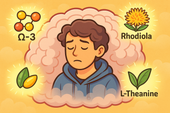
Brain Fog and Body Dysmorphic Disorder: Can Nootropic Supplements Help?
Brain fog often accompanies Body Dysmorphic Disorder, clouding focus and deepening emotional fatigue. Nootropic supplements like L-theanine, Rhodiola, and CoQ10 can help restore mental clarity, balance neurotransmitters, and bring calm energy back to the mind 🌿🧠.
-

How Stress Hormones Like Cortisol May Worsen Body Dysmorphic Disorder
Chronic stress floods the brain with cortisol — the hormone that keeps you on high alert. In Body Dysmorphic Disorder, this chemical overdrive fuels anxiety, distorts self-image, and traps the body in survival mode. Calming cortisol helps restore both peace and perspective 🌿🧠.
-

The Role of Neurotransmitters in BDD—and How Supplements May Help
Neurotransmitters like serotonin, dopamine, glutamate, and GABA shape how people with Body Dysmorphic Disorder perceive themselves. When these brain messengers fall out of balance, perception distorts — but targeted supplements can help restore calm, focus, and emotional regulation 🧠🌿.
-

What Is Body Dysmorphic Disorder? A Deeper Look at the Mind-Body Connection
Body Dysmorphic Disorder (BDD) isn’t just about appearance — it’s about perception. When brain chemistry, trauma, and stress distort self-image, the mind begins to see flaws that aren’t truly there. Healing starts by calming the nervous system and reconnecting mind and body 🪞🧠.
-

Keeping Calm in Competitive Sports: How to Train Your Mind, Body, and Chemistry for Peak Performance
Competitive pressure can overwhelm even the strongest athletes — but calm is trainable. By combining supplements like magnesium, L-theanine, and adaptogens with breathwork and mindset training, you can stay focused, balanced, and in control under any level of stress 🧠🏅.
-

Supplements for Parents Facing Toddler Tantrums: Staying Calm When Little Emotions Run Wild
Toddler tantrums can drain even the most loving parent — but your calm is powerful. With the right supplements like magnesium, L-theanine, and ashwagandha supporting your nervous system, you can stay patient, grounded, and kind, even when emotions run high 🧸🌿.
-

Workplace Stress and Anger Management Support
Workplace stress can quickly turn into frustration — but calm is a skill you can train. By combining supplements like magnesium, L-theanine, and adaptogens with breathwork and mindset tools, you can stay focused, patient, and emotionally grounded no matter how intense the office gets 💼🌿.
-

How to Stay Patient With Family During Stressful Holidays
Holiday gatherings can stir up old stress and test your patience — but calm is possible. With nervous system support from magnesium, L-theanine, and adaptogens, plus mindful breathing and clear boundaries, you can stay centered, kind, and grounded even when family chaos unfolds 🎄💞.
-

Supplements to Keep Calm During Traffic Jams
Getting stuck in traffic doesn’t have to ruin your mood. With calming supplements like magnesium, L-theanine, and ashwagandha, you can train your body to stay relaxed and focused behind the wheel — turning gridlock into a moment of grounded patience 🚗🌿.
-
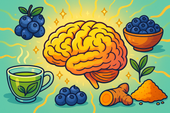
The Role of Antioxidants in Healing Brain Stress from Dissociation
Antioxidants protect the brain from the oxidative stress caused by trauma and dissociation. By neutralizing free radicals and supporting mitochondrial recovery, they help restore clarity, focus, and emotional balance — allowing the mind to heal at the cellular level 🌿🧠.
-
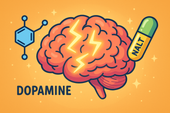
N-Acetyl L-Tyrosine (NALT) for Supporting Mental Clarity
N-Acetyl L-Tyrosine (NALT) fuels dopamine production — the neurotransmitter of focus and motivation. By supporting brain chemistry during stress, NALT helps restore mental clarity, energy, and alertness, making it easier to think clearly and feel present again ⚡🧠.
-

How Ginseng May Improve Focus and Energy in Dissociation
Ginseng helps combat the mental fatigue and fog that often come with dissociation. By supporting mitochondrial energy, balancing neurotransmitters, and regulating cortisol, it gently restores focus, motivation, and emotional presence — helping the mind reconnect with clarity and strength 🌿⚡.
-
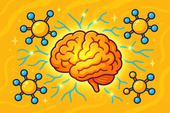
Phosphatidylserine and Dissociation: Supporting Cognitive Function
Phosphatidylserine helps calm the stress response by balancing cortisol, the body’s primary stress hormone. By lowering cortisol spikes, it protects memory, focus, and emotional stability — restoring clarity and mental presence for those struggling with dissociation 🧠🌿.
-
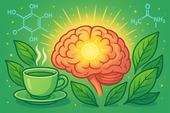
Can Green Tea Extract Help with Dissociative Brain Fog?
Green tea extract may help lift dissociative brain fog by supporting neurotransmitter balance, reducing inflammation, and enhancing energy at the cellular level. With its key compounds EGCG and L-theanine, it promotes calm focus, clarity, and emotional presence — helping you feel more alert and grounded 🍵🧠.
-
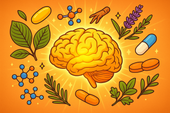
Building a Natural Supplement Stack for Dissociation Support
Building a supplement stack for dissociation means nourishing the brain and body back into communication. By supporting neurotransmitters, gut health, and energy balance through nutrients like magnesium, omega-3s, curcumin, and probiotics, you can help restore clarity, calm, and connection — one layer at a time 🌿🧠.
-

Chamomile and Lavender for Dissociative Anxiety Relief
Chamomile and lavender work together to calm dissociative anxiety by soothing the nervous system and restoring emotional safety. Their natural compounds balance cortisol, enhance GABA activity, and activate the vagus nerve — helping you feel grounded, connected, and at peace again 🌿💜.
-
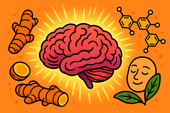
Curcumin for Inflammation and Mental Clarity in Dissociation
Curcumin, the golden compound in turmeric, does more than fight inflammation — it helps clear the mental fog often tied to dissociation. By calming neuroinflammation, balancing neurotransmitters, and supporting mitochondrial energy, curcumin can restore mental clarity, focus, and emotional presence 🌿🧠.
-
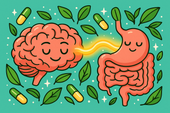
Probiotics and Dissociation: Exploring the Gut–Brain Axis
The gut–brain axis plays a vital role in emotional awareness and presence. When the microbiome is balanced, it supports serotonin production, vagus nerve activity, and calm focus. Probiotics help repair this connection — restoring safety, clarity, and the feeling of truly being in your body again 🌿🧠.
-
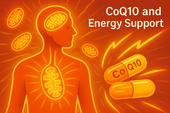
CoQ10 and Energy Support for People with Dissociation
Chronic dissociation often leaves the body running on empty — tired, foggy, and disconnected. CoQ10 helps recharge that system at the cellular level by restoring mitochondrial energy, reducing oxidative stress, and supporting the brain’s capacity to stay present. It’s energy medicine for both body and mind ⚡🧠.

















































